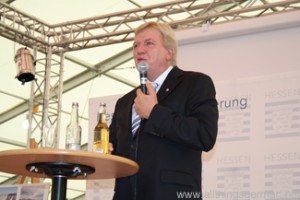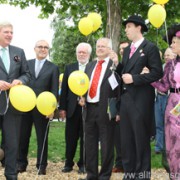The Ministerpräsident (prime minister) of the State of Hesse, Volker Bouffier answered citizens’ questions at the Hessentag on Sunday. The Bürgersprechstunde took place on the stage in Hall 1 of the Landesausstellung and lasted for an hour.
The question and answer session was chaired by Statesecretary and Spokesman of the government of the State of Hessen, Michael Bußer.

Ministerpräsident Volker Bouffier (r) and Statesecretary Michael Bußer (l) answering questions at the Hessentag
Topics covered included the school situation in Oberursel, the extension of one school in particular, although no answer here was forthcoming because it is apparently not something that the state is responsibly for, rather the local district council (Kreis). Strangely, when that council was being elected, the politicians said the exact opposite.
The new Hessian School Law that has just been approved and comes into force over the summer was also discussed, in particular the decision to allow parents of disabled children to decide whether they should go to a special school or be integrated into a normal class of children. Some were worried, that this may mean an end to the special schools.
MP Bouffier promised “Die Förderschule wird nicht abgeschafft” (specials schools will not be discontinued).
The Atomausstieg (plan to get rid of nuclear power) led to a discussion on how to go about this. MP Bouffier said that the future energy supply needs to be secure before the reactors are shut down, as it makes no sense to shut Germany’s down and then import nuclear power from France and the Czech republic. He also said that alternatives needed to be affordable. Later he returned to the subject saying that we should think about the solutions at least briefly, before committing to them.
There was a small point made about the lack of Wetterfernsehen on the Hoherodskopf, as unlike the Feldberg this mountain does not have a webcam for visitors to see the weather before they go there.
Not something for a prime minister to worry about, but he liked the idea.
Then there was some discussion about the state of part of the Hessian rail infrastructure. We were told that the state invested €600million last year in improving this, but obviously this is still not enough.
I then used the opportunity to asked about plans to expand the use of social media such as Twitter and Facebook. I said that I left open to debate whether the state really needed to do this, although it is probably the right way to go to get younger people interested in the workings of the Hessian state. However I pointed out that these things needed to be done properly, and not used as another place on the internet to publish press releases.
I cited my example of the non-cooperation with bloggers by the State Chancellery at the Hessentag, especially the lack of reponse to my requests except the blank statement that bloggers would not be accredited, and said that if the State is serious about using social media, then they need to work with people who understand it and use it on a daily basis, and not shut us out, and suggested that they make a difference between someone who blogs for a hobby or has just registered a new domain to gain an advantage at an event, and someone who does it for a living and pays tax on the blog’s income.
I mentioned how well the town of Oberursel had embraced the subject of blogging about the Hessentag in English as a counter-example.
This was the only question that he did not have an answer for and passed over to Statesecretary Michael Bußer. He pointed out that Hessen was the only state in Germany to have a presence on Twitter, but admitted that the Facebook page could be better (note: I cannot find it at all, but there are official Facebook pages for Volker Bouffier and the Hessentag). He cited the depth of information available on www.hessen.de as a positive aspect, and said that new things were being planned and should be in place by the time of the next Hessentag in Wetzler in 2012.
He did promise to find out why the State Chancellery was not returning my calls or e-mails, and took my details after the Q&A session had finished.
Finally there was a question about staff levels at schools. One particular type of position is due to be cut back. MP Bouffier responded that it was a fine line between giving education such a large budget, and not creating now debt for the state.
The priority for the education budget is the repair and renovating of school buildings (of which there were 600 completed in the last 3 years), and the employment of new teachers (1000 in 2010, 650 so far in 2011).
I have to say that as the parent of a school child, those seem quite good priorities to have.
MP Bouffier came across as someone who was prepared to listen to suggestions, and also to explain decisions that he had made. At the same time he appeared to be very careful not to make promises that he could not keep.






Speak Your Mind